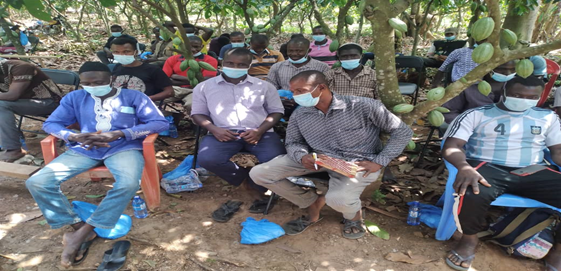
Penteng (A/R), March 29, GNA-The Asante Kingdom Landscape Restoration Programme (AKLRP), has stepped up campaign against the wanton destruction of water bodies and forests.
The buffer zones of Lake Bosomtwe and the Owabi and Barekese Dams have come under attack by private developers and farmers, exposing the two valuable water bodies to recession despite huge investments to protect them under the AKLRP.
Lake Bosomtwe is a tourist site and the only natural lake in Ghana, raking in tens of thousands of Ghana Cedis annually in revenue, but it has been receding over the years due to detrimental human activities within the buffer.
The Barekese Dam on the other hand, provides 80 per cent of the water needs of the population of Kumasi and its environs and must be protected at all cost to avert water shortage in the Metropolis.
It is against this background that AKLRP is scaling up efforts to halt the practice through stakeholder engagements and sanctioning of recalcitrant perpetrators.
The Programme, which is under the auspices of the Manhyia Palace is being implemented by the Oheneba Poku Foundation to restore forests and water bodies in the Kingdom.
In line with this, the Oheneba Poku Foundation led various government agencies to engage farmers in communities in the catchment areas of the Barekese Dam on the need to adopt best farming practices that would not pose a threat to the survival of the dam.
They were Ghana Water Company (GWC), Water Resources Commission (WRC) and the National Disaster Management Organization (NADMO).
The exercise, which coincided with the celebration of World Water Day also sought to sensitize the farmers on the need to stay away from the buffer zone of the dam.
Over 400 farmers who participated in the exercise pledged their commitment to protect the dam and expose any farmer who would encroach on the buffer.
They assured the delegation of their collective efforts to preserve the buffer and expressed their desire to plant trees, if seedlings were made available to them.
Mr. Fred Kyei Sapong, Coordinator of the AKLRP, said it was imperative to restore the forest and water bodies to their natural state as a means of mitigating the impact of climate change and the vision of the Asantehene was to promote climate-smart agriculture to build resilience of smallholder farmers within the cash and food crops bracket.
He urged the farmers to desist from inimical farming methods to preserve the environment and underlined the need for them to adopt Asante traditional ecological knowledge and socio-cultural land management practices such as “proka” in order to maintain the nutrients in the soil.
Mr. Sapong also expressed concern about the usage of weedicides especially close to the dam, saying that such chemicals ended up in the dam anytime it rained, thereby affecting the quality of water being treated for public consumption.
Mr. Adam Yakubu, the Regional Water Quality Manager of Ghana Water Company, said the application of agro-chemicals close to the dam did not only affect the quality of water in the dam,, but also cost of production and the poor quality of the raw water reduced the volume of water supplied to the public because most of the water was wasted in the course of treatment.
GNA